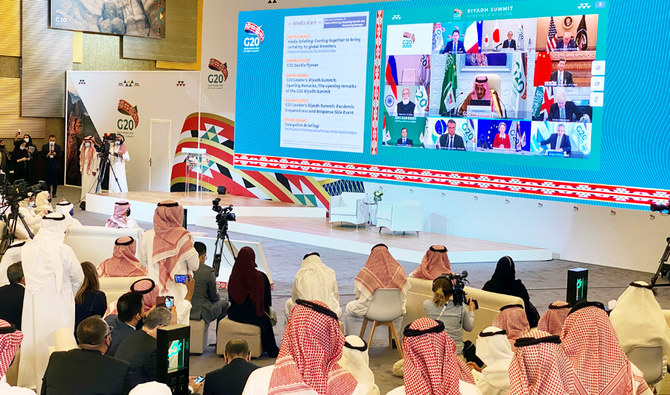RIYADH: The Saudi G20 presidency is driving an ambitious approach to circular carbon economy (CCE), to manage greenhouse emissions across the world and industries to protect the planet, King Salman said.
He was addressing Safeguarding the Planet, a side event on the second day of the leaders’ summit.
“As we recover from the repercussions of the pandemic, we must create the conditions conducive of robust, inclusive, balanced, and sustainable economies by means of enabling people, safeguarding the planet, and shaping new frontiers to seize the opportunities of the 21st century for all,” the Saudi leader said.
“With the increase in emissions due to economic and population growth, we must pioneer sustainable, pragmatic and cost-effective approaches for achieving ambitious climate goals.
“In this spirit, the Saudi presidency has promoted the circular carbon economy (CCE), which allows the holistic management of emissions to mitigate the challenges of climate impact and advance cleaner and more sustainable energy systems, as well as advancing stable and secure energy markets and energy access,” he told the participants.
Through this initiative, said King Salman, the world’s countries will be able to adopt and promote technologies that match their transition paths through the 4Rs of CCE (Reduce, Reuse, Recycle, Remove).
With the increase in emissions due to economic and population growth, we must pioneer sustainable, pragmatic and cost-effective approaches for achieving ambitious climate goals.
King Salman
“Together, the ‘4Rs’ comprise a holistic, integrated, and pragmatic approach that values all options to managing emissions in all sectors.”
He said that Saudi Arabia will formally launch a dedicated CCE National Program that will consolidate and accelerate the current momentum toward sustainability in a holistic manner.
In terms of renewables, Saudi Arabia has “great plans” that include wind and solar which will generate 50 percent of the Kingdom’s electricity by 2030.
World leaders participating in the event included the Italian Prime Minister Giuseppe Conte; Indian Prime Minister Narendra Modi; Chinese President Xi Jinping, Japanese Prime Minister Yoshihide Suga; Australian Prime Minister Scott Morrison, and US President Donald Trump.
“The existential threat posed by climate change, land degradation and the decline of global biodiversity has already brought us to a crossroads, one that will determine whether we are able to safeguard our planet and build a sustainable future,” said Italian leader Giuseppe Conte. “I am convinced the G20 can lead the world in the right direction.”
The Japanese prime minister said that global environmental issues are urgent challenges that the international community should address. “We, the G20 leaders, need to take the lead and work together as a team … for this great mission of ‘Safeguarding the Planet,’ Japan will take the initiative while continuing further collaboration with other countries.”



























